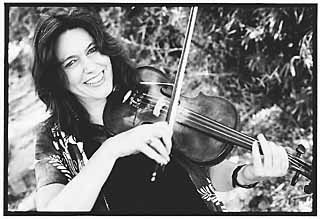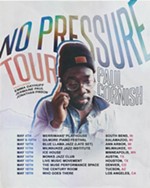A Survivor's Journey
By Jay Hardwig, Fri., June 4, 1999
The woman goes back to the hotel to wait for her husband to come home and pass out. This has been her life -- their life -- out on the road. In the silence, she packs: guitar, fiddle, three microphones, and a stack of Django Reinhardt records. T-shirts, toothbrush, some underwear, and finally, $200 in travelers' checks -- escape money from her worried father. Midnight rolls past, then three, four, five in the morning. Her husband is nowhere to be seen. Neither are the police. She waits.
|
|
Just before 6am, her husband returns, staggering drunk. He realizes immediately what is happening. Furious, he starts to beat her, backing the woman into the corner of their tumble-down room. Grabbing a beer bottle, he breaks it in half and holds the shards to her throat. He begins to push the glass, slowly, into her skin.
"And then he gets really calm," recalls Darcie Deaville. "His mind would just switch. If it had just switched in the way he decided to put the glass in my neck ... but it switched the other way. I was just lucky that time."
The next day, Deaville's father sent two friends on a plane from Winnipeg on a rescue mission. They flew into Edmonton, drove to Jasper, and 18 hours later, escorted Deaville from her hotel room. The police never came.
Twenty years later, Deaville's Chicago-based label, Redwing Music, calls her new album Tornado in Slo Mo a "survivor's narrative." With good reason: The songs are written from experience, Deaville singing of flight and strength, of secrets and their telling, of hope and hurt and desolation. The subjects are grim -- physical abuse, sexual abuse, incest -- but the album's tone is one of stubborn triumph rather than fear and defeat. Darcie Deaville, it seems, knows a thing or two about survival.
"I'm not really a crusader," says Deaville over migas and coffee at Curra's Grill on a rainy Friday morning, "but I feel like I did survive a whole lot of stuff. When I wrote the songs [on Tornado in Slo Mo], I was just into telling all. I told myself, 'No, don't sweep this stuff under the carpet.' Still, people don't like to hear 'Icy Barrel of a Loaded Gun.'"
"Well my grandpa held me upon his knee, he said, 'Little girl, what do you want to be?' He said, 'Don't you want to be papa's girl, and let me touch your pretty curls?' If I said I didn't want to touch that way, I knew that there would be hell to pay. Well, my grandpa held me upon his knee, and I'll never forget what he did to me. In the darkened night nowhere to run."-- "Icy Barrel of a Loaded Gun"
Although Deaville did suffer sexual abuse as a child, she says "Icy Barrel of a Loaded Gun" is fictionalized. "It's close enough," she concedes. After many years of burying the memories, she decided to confront it -- write about it, bring it out into the open. The more often sexual abuse is admitted, acknowledged, and understood, argues Deaville, the greater chances are of saving others.
"It's really not fair for older people to take advantage of little kids. Little kids have no idea what's going on. It's just a weird thing. Older people, if they have those tendencies, need to examine why, and they need to get through it in a different way, instead of wrecking somebody's life. Because people's lives really do get ruined."
When Deaville decided to write about her personal journey, she naturally turned to song: a singer, songwriter, and fiddler of local fame, she's been a performer all her life.
"The only thing I really had all through growing up was music," Deaville explains. "I played guitar. I was trying to be Neil Young. I always had this idea in my head that I was gonna be famous and I'd show everybody."
If her childhood was a musical one -- Deaville started piano lessons at age six, violin not long after -- it was also an itinerant one. Her father was a bush pilot in the Canadian oil fields, a helicopter man who moved his family from town to town in the cold Canadian north: Timmins, Cranberry Portage, Goose Bay, Labrador. The family's environs were both simple and tough -- subzero temperatures, wood-burning stoves, no running water at times -- and when Deaville's mother asked out of the arctic life, the family started on a more southerly circuit, a stateside route that included Denver, Florida, Connecticut, and New York. By the time Deaville dropped out of a Toronto high school at age 16, she had been to 22 schools in 10 years.
Finished with school and forced from home, Deaville took up with a group of Toronto street musicians and started busking for tips, playing Stones and Zeppelin covers and once smashing a $15 guitar for pure theatrics. Several years later, she and her boyfriend, who would soon be her husband, left Toronto for the Canadian Rockies, ultimately settling in Banff, Alberta. For the next 10 years, with her husband and without, Deaville toured western Canada, a flatpicking gypsy whose tastes turned from Plant and Page to Lefty Frizzell and Bill Monroe. It was a life of cheap hotels and sad-sack frontier beer joints, driving 500 miles through northern nights, tucked into the front seat of an oil-burning piece of crap, passing a bottle of Scotch and listening to Mystery Theater on the radio.
In the early years, she was playing six nights a week and practicing eight hours a day, singing the standards but trying to avoid the obvious. Nevertheless, one sang what the crowd called for, and Deaville remembers playing "Orange Blossom Special" and "Dueling Banjos" three times in a night. Through it all was the specter of violence: first its incidence, then its memory. It's not a life she'd care to return to, but she admits the grueling schedule did wonders for her guitar skills.
After leaving her husband, Deaville started traveling and performing with Canadian country/folk stalwarts Cathy Fink and Duck Donald, a collaboration that lasted a few years before she quit Canada and moved to San Francisco. It was in the Bay Area that she fell in with a bluegrass band that already had a guitar picker, so Deaville brought her dormant fiddle chops up to speed. "It came much more naturally than the guitar ever did," says Deaville, who's played the instrument ever since. Being a musician in San Francisco is a good way to get yourself broke and hungry, and within a few years Deaville was both. Her mother urged her to come to Phoenix, where she herself had relocated, and Deaville agreed, living in Phoenix for nine years. She built a solo career in a succession of country bands, before landing in Austin on Election Day, 1992.
In the seven years Deaville has resided in Austin, her profile has increased steadily: in addition to her solo career, she plays regularly with the Meat Purveyors (she calls herself "half a Purveyor") and pops up as a side player for everyone from Jimmy LaFave to Ani DiFranco. In addition to fiddle and guitar, she's picked up the mandolin, even though $10,000 worth of tendonitis in her wrists has hampered her flatpicking style. "I pretty much lost all my guitar chops," she says matter-of-factly. "I don't play like I used to."
Deaville never did become rich and famous, as she promised her childhood tormentors, but she has achieved a strong local reputation, and at long last, a measure of inner peace.
"I had to come to terms with the fact that being rich and famous isn't the real thing anyway," she says. "[Instead], it's how can I live a good life and play music. I'm still trying to figure that out. But it's okay. It's definitely okay. I had that to hold onto my whole life, so I was just able to sink into the music and escape everything else."
"Well, my grandpa held me upon his knee, and I'll never forget what I did to me ... Now I remember the vow I made that day, and the peace I've found has let me say nobody's ever gonna hurt me now. It's something I will not allow ... I'll never forget that he caused me pain, and my mama too, but I broke the chain, because nobody should ever have to run from the icy barrel of a loaded gun."
Deaville's not finished with the songs on Tornado in Slo Mo. She's made them the core of a play she's currently writing, "a survivor's journey" based on her own life. And while the play will be serious, Deaville hopes it isn't depressing.
"I wanted to make it have a good ending. I have scars and I always will have scars, and maybe they'll get opened once in a while, but mostly I'm doing pretty well. I really understand a lot of stuff about what happened."
After the play is finished, Deaville says, she'll be ready to move on.
"I'm not going to always be writing about this, but that's what this album is about: You can get out of these things and do something for yourself, if you just know you can."
A valuable message, and one hard-earned. But for her next album she wants to have a little more fun. "I'm thinking fiddle tunes," she says. She stops and sighs, and grins at the thought.









